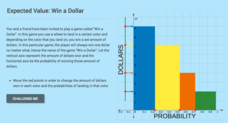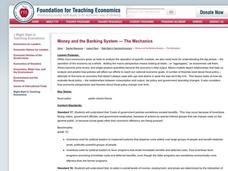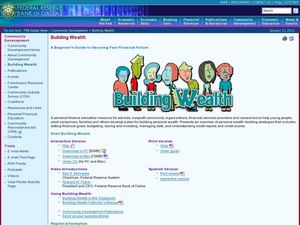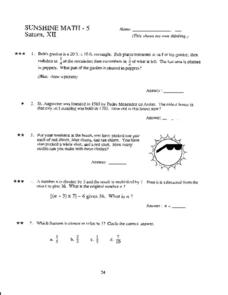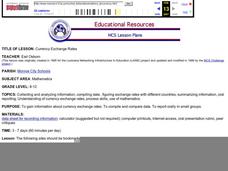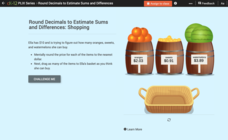CK-12 Foundation
Expected Value: Win a Dollar
Spin a wheel, land on a color ... and win. Learners create a graph to display the probabilities of the amount of money they can win by spinning a colored wheel. The pupils use the dollar amounts and their probabilities to calculate the...
CK-12 Foundation
Numerical Computations: Counting Out Probability
Keep your heads up while counting. Pupils use an interactive to create a table with the possible outcomes of flipping three coins and then determine the probabilities of getting certain combinations of heads and tails.
CK-12 Foundation
Multi-Step Equations with Like Terms: Shipments
Who doesn't like boxes of money? A drag-and-drop interactive lets users separate variables and constants to combine like terms. They answer a set of challenge questions based on the results of the interactive.
CK-12 Foundation
Checking Solutions to Inequalities: Apples and Bananas Shopping Excursion
Go bananas over a fun interactive! Learners drag a point on a virtual graph of an inequality to see if it is a solution. This helps determine the possible numbers of apples and bananas a shopper can buy with a given amount of money.
CK-12 Foundation
Even and Odd Functions and Function Symmetry: Even and Odd Functions (Symmetry)
Even money states that the resource is good to use. Scholars manipulate an interactive to adjust the portion of a graph to the left of the y-axis. The interactive allows them to switch between even and odd modes that show the right side...
Curated OER
Multiplying and Dividing Decimals
Learn to multiply with decimals. The class reviews multiplying multi-digit whole numbers based off of word problems. Then they learn how to multiply using decimals and practice with money problems.
Curated OER
Passport to the Eastern Hemisphere
Seventh graders explore the Eastern Hemisphere. They investigate the customs, currency, climate, location and other facts needed in order to travel to a specific country. Students receive a stamp on their "passport" when their research...
Curated OER
Paws in Jobland Number Crunch
Learners analyze real life jobs that involve math. They discuss jobs where math is used, and explore how math is important in many areas and research some of these jobs in the book "Paws in Jobland." They complete a worksheet with four...
Curated OER
Be the Kiwi: Money and Banking
Students practice converting money systems and interest. For this money lesson, students convert U.S. and New Zealand dollars. Students also discuss international travel and money exchange rates.
Curated OER
Grade 3 Spring Themed Word Problems: Problem 1
In this math worksheet, 1st graders solve one story problem which involves multiplying single digit dollar amounts plus addition of money without pennies. There is a work space for students to show their calculations.
Curated OER
Finding Mass
Student measure mass to discover how pennies have changed in their composition. In this measurement lesson, 8th graders investigate through an open-ended problem to discover how the US pennies composition changed in the 1980's.
Curated OER
Pocket Change
Young scholars practice identifying coins and their values. For this money identification lesson, students play a game, where they toll a coin, determine the value, and compare totals to win.
Curated OER
Combien co¿¿te?
Students engage in conversation using the target vocabulary and grammar structure while discussing prices in euro. They also engage in listening and writing skills related to these topics. Finally, students identify and analyze the...
Curated OER
Money and Banking
Students explore the role of government in the economy market. In this economics lesson plan, students analyze the decision making and how it takes into consideration additional cost, benefits and public awareness of what they are trying...
Curated OER
Building Wealth
Students explore budgeting. in this building wealth lesson, students examine ways to invest and save money. They set financial goals and determine methods to reach the goals. Students discuss managing debt, credit reports and credit...
Curated OER
Sunshine Math-- 5
In this math review worksheet, students solve 8 varied problems that include adding mixed numbers, money, decimals, elapsed time. and a math puzzle.
Curated OER
Currency Exchange Rates
Students, in groups, choose three countries from which to investigate exchange rates versus the US dollar. Using Internet research they follow daily exchange rates and compute the percentage change. They compile data and prepare and...
Curated OER
Right on the Money
Young scholars watch a video about different ways of making the same amounts of money and view a clip about the Denver Mint to discover how coins are made. They complete a Web activity on each coin's worth and find out facts about the...
Curated OER
Transportation Math
Students practice their problem solving skills. In this addition and subtraction lesson, students solve story problems regarding the delivery of consumer goods.
Curated OER
Show Me the Money
Pupils investigate financial applications of mathematics in this mathematics lesson. They will investigate equations that represent a company’s income, expense, and profit functions and use those equations to identify break even points...
Curated OER
Math Hw #15: Proportions
In this proportions activity, students solve 8 word problems. Students determine the cost of an item given a unit cost. Students find a missing side length of a triangle using proportions of similar triangles.
Curated OER
Four Famous Faces
Each one of our quarters is embellished with a famous face or image representing the state it came from. This lesson plan uses South Dakota's state quarter to get kids thinking about monetary value, what the president of the United...
CK-12 Foundation
Problem Solving Plan, Estimation with Decimals: Shopping
Mathematicians go on a virtual shopping trip in an interactive designed to boost the concept of estimation. Scholars read and answer five questions—multiple-choice, true or false, and a discussion—with help from a drag-and-drop shopping...
Curated OER
Comparing and Ordering
Before handing out this number comparison activity, ask scholars to pick a number between 20 and 50. Could they do it? Explain that they chose a number greater than 20 and less than 50, which is exactly what they will be doing next. Each...


